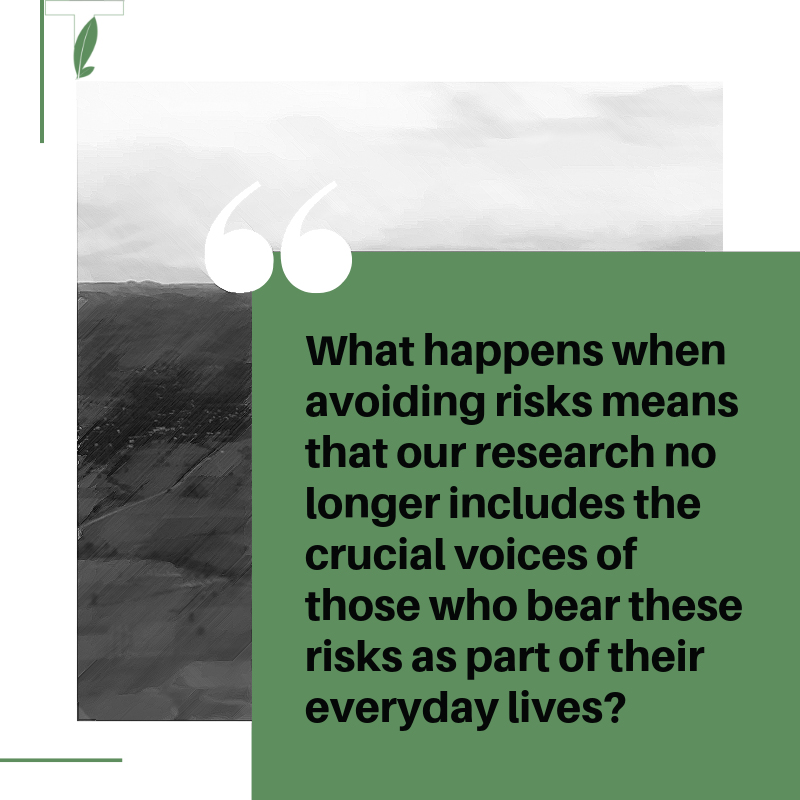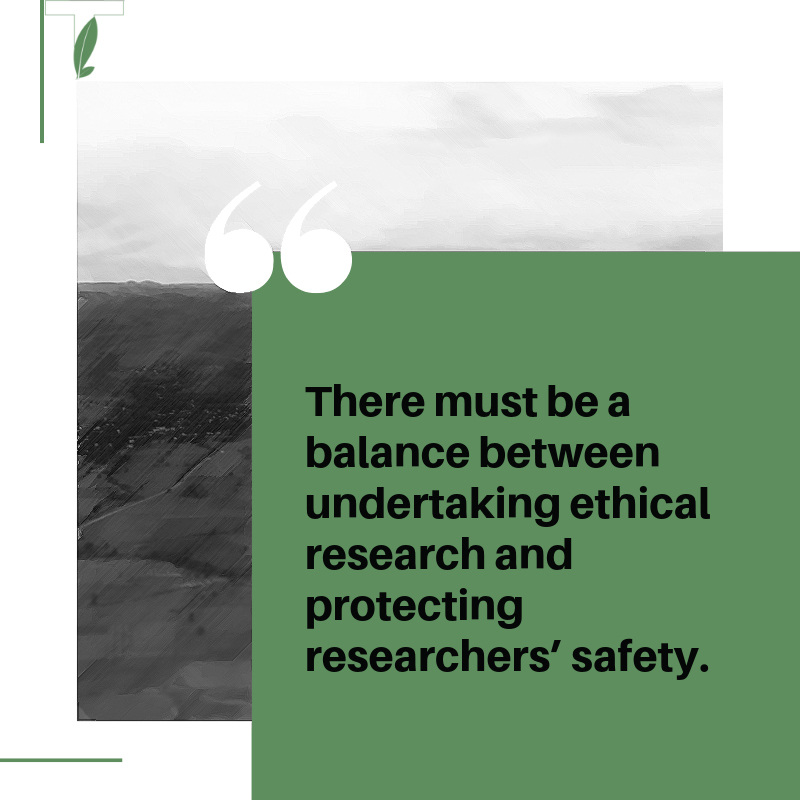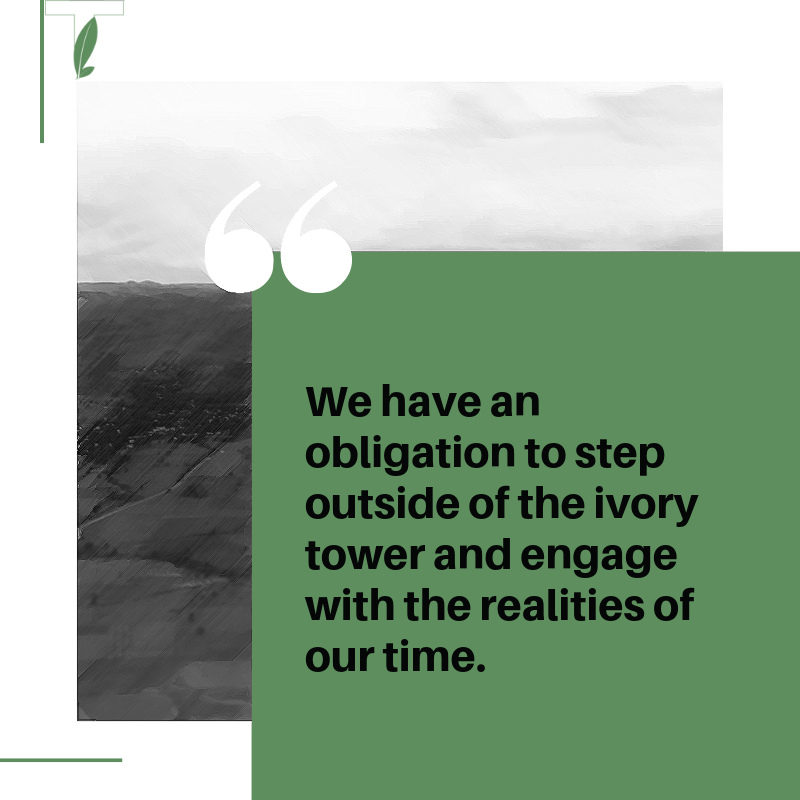The Ethics of Risk Mitigation in PhD Research
*By an anonymous PhD student
In November last year, a British PhD student – Matthew Hedges – was arrested and sentenced to life in prison, accused of spying for the British government while on a research trip in the UAE. Though he was pardoned and released a week later, the incident managed to stoke the already heated debate regarding universities’ responsibility for their students conducting overseas fieldwork, which had been initially provoked by the murder of Cambridge student Guilio Regeni in Egypt in May of 2016. Within weeks of Hedges’ arrest, my own university in Australia had implemented a new rule requiring any PhD field fieldwork in the Middle East to undergo specific ‘high risk’ clearance. This new policy came on top of the university’s existing requirement for clearance for any fieldwork conducted in areas where conflict or political instability had been earmarked as a risk by the Australian Foreign Affairs department (DFAT).

It was in this climate that I found myself rushing through my own high-risk travel application, seeking permission to do my own PhD research in one of Myanmar’s ethnic state capitals – a town which remains relatively safe, yet falls within one of DFAT’s ‘high risk’ locations due to the status of conflict in surrounding areas. Having visited this town several times in the last few years I had no reservations about returning. I had consistent advice from my Myanmar friends that it was still safe for foreigners to visit, and their proximity to the situation on the ground gave their advice more credence to me than many of the opinions floating around Yangon or Canberra. Despite this, it was nearly impossible to convince the university’s external risk assessment team that this advice could be taken seriously.
The frustration I experienced during this process was compounded by having come on the back of a lengthy ethics application in which it seemed that there was more concern for my safety than for that of my participants. This experience made me reflect on the way in which the question of ‘risk’ has slowly superseded the interests of ‘ethics’, and the implications this has for what student researchers are learning about doing good research. Though designing and conducting ethical research is in many ways concerned with minimising risks (to participants), it is not simply about establishing a risk mitigation strategy. Ethical research should minimise the potential for harm to participants. At the same time, the benefits – whether practical or theoretical, direct or indirect – should outweigh the risk of harm. In this cost-benefit analysis, it is the experiences of participants – not the researchers – that are meant to be centred, despite the emerging trends in practice. According to Australia’s National Statement on research ethics, the values of respect, research merit and integrity, justice, and beneficence sit at the core of all ethical research. In particular, the value of justice requires that participants who should be included, are included, in a non-exploitative way. If research cannot be inclusive of, and responsive to, the voices of those whose lives are more precarious than our own, then where does this leave us?

I can’t help but worry that this manifestation of the ‘risk society’ (to use a term coined by Ulrich Beck) leaves little room for a fundamental responsibility of research: our ethical responsibility to our participants and the broader public. Of course, some degree of concern is to be expected from a university wanting not only to avoid the kind of bad publicity of the Hedges and Regeni incidents, but also burdened by a very real, legal responsibility for the safety of its student researchers. However, in contexts where conflict, misrule, or the environment present a heightened risk to the researcher, is it possible to do ethical (or inclusive, participatory) research if the researcher must be so risk-averse? What happens when avoiding risks means that our research no longer includes the crucial voices of those who bear these risks as part of their everyday lives? Would it then be more ethical not to do research in such contexts at all?
From the conversations I have had with academic staff, early career researchers, and other PhD students, it seems as if these risk mitigation protocols are generally treated as part of the bureaucratic red tape, rather than strict guidelines to be followed religiously even when they do not make sense in the local context. A proverb many in the academy will be familiar with is: ‘it is better to beg for forgiveness than to ask for permission’. However, it is also far harder to take this approach as a PhD candidate than a senior academic; we have supervisors to whom the university has delegated a somewhat guardian-like responsibility for our safety. What are the ethics of hiding the potential risks within your fieldwork from the people who may ultimately bear responsibility for your actions?
In sociology, risk is generally considered to be a socially constructed phenomenon; this means that it is not something that exists only in relation to the actual harm it is associated with, but the perception of risk is something that is constructed through social processes. This does not mean that risk is meaningless, but that it is understood and negotiated differently in different contexts. This means that as researchers, we cannot use the same strategies at home as we do ‘in the field’. In rural Myanmar, the risk of being caught up in a military operation may be best negotiated by paying attention to local word-of-mouth intelligence. In urban Australia, I might negotiate the more likely risks of fire, robbery, or medical illness by transferring these risks to capital markets through insurance policies. The right information can be just as good currency as the right insurance plan, depending on the context. Working out how to reconcile the two when you are caught between the academy and the field is the tricky part.

It is undeniable that academic institutions should be concerned about the potential harms that student researchers open themselves up to when undertaking fieldwork. However, we surely have an obligation to step outside of the ivory tower and engage with the realities of our time, particularly for those of us who seek to democratise the acts of knowledge-production and knowledge-sharing. There must be a balance between undertaking ethical research and protecting researchers’ safety, and it seems more needs to be done to emphasise the former. If not, we run the risk of researching ourselves into obsolescence, and, for a researcher, isn’t that the greatest risk of all?
*The views expressed in this article are that of the author and does not necessarily reflect the views of The Tea Leaf Center. If you are interested in contributing to our blog, please contact us at info@thetealeafcenter.org

